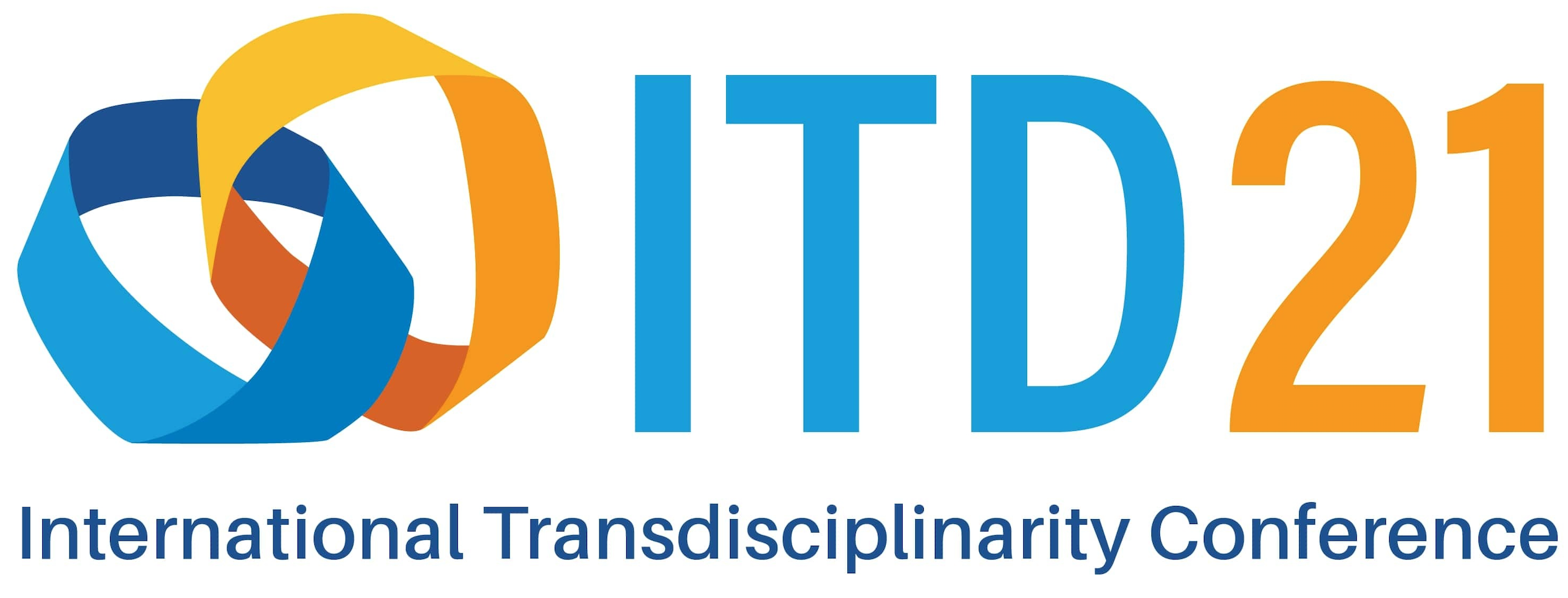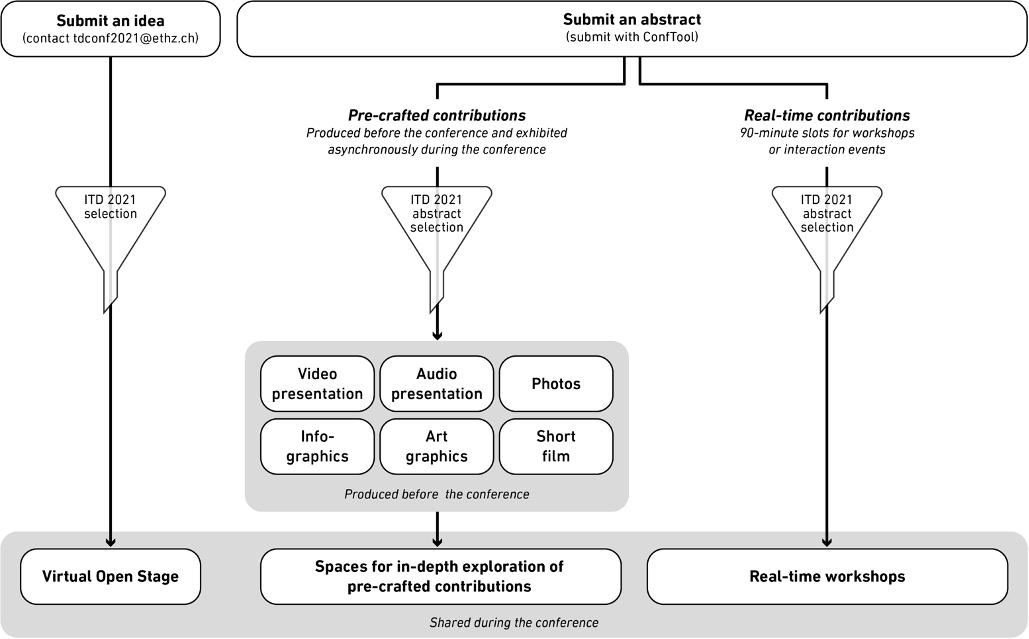Network for Transdisciplinary Research

Call for Contributions
We invite contributions from all fields and research cultures, while particularly welcoming submissions from practitioners and from transdisciplinary teams. Please indicate how your submission aligns with the following streams, questions, and formats. Choose one primary stream then indicate one or more key questions relevant to your contribution. Please feel free to also add additional questions that contribute to the selected stream.
The ITD Conference 2021 focuses on expanding expertise and deepening knowledge through the creation of transformative landscapes and timeframes in, and between, the Global South and North. We seek to strengthen intra-, cross-departmental and institutional learning and collaboration within and across cultures.
Important dates
Deadline for abstract submission: Call closed. We received a record number of 240 abstracts.
Notice of acceptance: June 2021
Online Conference: September 13 – 17, 2021
Conference Streams and Questions
Integrative TD: advancing concepts and methodologies
- How can we increase the capacity to integrate expertise from multiple fields of knowledge (i.e., systems thinking, participatory action research, humanities, arts, design, amongst others) and professions to advance transdisciplinary concepts and methodologies?
- How do we do this while acknowledging difference and plurality in language and action?
- How can we use and build on this integration to contribute to envisioning and co-producing alternative futures, with what criteria?
TD on-the-ground: making TD tangible
- What tangible transdisciplinary processes and practices are taking place on-the-ground?
- How can we better understand the impact and effectiveness of these processes and practices from successes and failures?
- How can we use these examples to improve existing transdisciplinary practices and to facilitate inclusive and equitable research?
Global and virtual TD: connecting and enabling diverse communities and practices
- How can we use virtual environments to leverage TD collaboration, especially in a Global South-Global North context?
- What opportunities and challenges occur in applying TD in diverse geographical, social, political, and cultural contexts?
- What are innovative examples of communities of learning and practices that have yet to mainstreamed in TD?
TD learning for transformation: contributing to transformation through TD learning
- What can we learn from other forms of collaborative learning, e.g. from Education for Sustainable Development, that would help students to build the capacity to work on societal challenges? How can we support collaborative learning in intercultural contexts?
- How can TD concepts contribute to personal transformation and development?
- How can we navigate between positions of neutrality, activism, and emancipation in a TD process? What roles can we play in such processes and why are those relevant?
Institutionalizing and funding TD: anchoring TD
- What greater role can TD play in higher education institutions and in society? How can we assess the benefits of TD practices in comparison to other approaches in decision-making processes?
- How can TD career paths be developed in existing institutions and what needs to be done to support them?
- What are appropriate funding schemes, program designs and management structures for TD research? How might we catalyse further financial support for TD?
Formats for Contributions
The online conference will include two main types of contribution: pre-crafted and real-time.
- Pre-crafted contributions will be produced before the conference and exhibited throughout the conference. The program will include specific sessions (equivalent to poster sessions in a conventional conference) when the pre-crafted contributions can be discussed. Details of how these sessions will be organised will be provided at a later date.
- Real-time contributions will be workshops and other forms of interactive events designed by participants who will offer them “live” during the conference.
Proposals for both types of contribution should include an English abstract (submit with ConfTool). The main language of the conference is also English. Pre-crafted contributions can be in other languages, but should include English subtitles or a short explanation in English. If you plan a real-time contribution in a language other than English, please contact the ITD 2021 office beforehand.

ITD Conference 2021 submission process
a. Pre-crafted contributions
Please submit an abstract (with ConfTool, max. 500 words) that addresses the questions above or other pertinent ones. These abstracts should explain the motivation and purpose of the work, conceptual approach and methods used, the main results and the conclusions. For each abstract, please also indicate one medium by which you wish to share your work. If we accept your abstract for a particular medium, we will send more detailed instructions, including technical specifications and copyright guidelines for each format. Formats include, but are not limited to:
- Short video presentations (<6 minutes). These can be designed as “classical” short talks with PPT slides or a short film.
- Audio recordings (<6 minutes). We encourage participants to explore story-telling and narratives as a means for sharing their work.
- Infographics. Participants can create a single, in-depth and self-explanatory graphic related to the core of their work.
- Art graphics. Instead of a print poster, participants may produce an original, aesthetic representation of their work that can be shared online.
- Photos. Participants may produce an original photograph that is representative of the approach and/or results of transdisciplinary work, along with a short written description of this photo.
These different types of contributions will be virtually “exhibited” before and during the course of the conference. During the conference, we will provide time-slots in which your work will be discussed.
|
Why the different formats? Our vision in planning this conference is to explore new ways of engaging with one another in an online context. The choice of online formats is intended to optimize your online experience, both as a contributor and as a member of the audience. During the conference, you will be free to move between the scheduled program of real-time events and the pre-crafted contributions, which can be viewed at any time. We encourage you to consider what is the most effective media for online viewing and listening based on your topic and talents. |
b. Real-time contributions
The conference will also have 90-minute slots available for workshops, trainings, panel sessions, or other interaction events designed by participants. The format and design are left to the creativity and aims of participants detailed in an abstract that covers the following topics (with ConfTool, max. 1000 words):
- What is the goal of your proposed online workshop or interaction?
- What could attendees of your online workshop or interaction take away from it?
- What communities do you want to reach?
- Description of the preliminary structure and design for your online event
Possible ideas for workshop and interaction formats can include, but are not limited to:
- Skills training of a particular research tool/approach
- Development of joint papers and grant ideas
- Boundary-object workshops where a concrete framework, concept, visual is the main focus of discussion
- Experience-sharing workshops, comparison between research and education contexts – linking different life-worlds
- Participant-organised panel discussions
- Exploration of a specific problem and possible solutions
c. Virtual open stage
During the conference there will be opportunities to open the virtual stage for interventions, performances, presentations, and exhibitions that go beyond categories listed above. Please contact the ITD 2021 office with your ideas and concerning requirements for these activities.
Abstract Submissions
Please enter your abstract through the ConfTool system:
CLOSED
